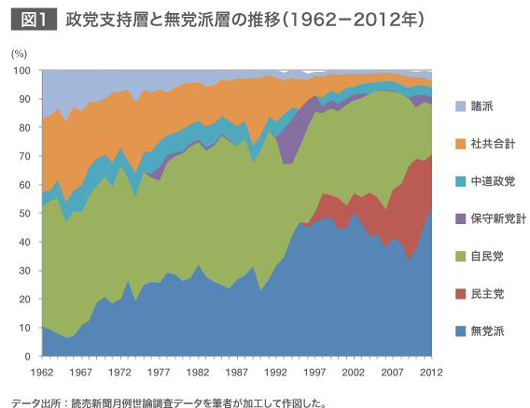
< December 16, 2012, principals of national election in Japan >
The regrettable point of this election didn't reflected public opinions. Furthermore, it is that the important point at issue has also disappeared.
The political party and the prime minister who lowered evaluation once came back. Again the same fault may occur.
This is a way repeated many times for the past seven years.
Six past prime ministers changed places about a year. But people did not have learning nothing from this occurrence.
Although the approval rating of their beginning was from 50 to 72%, it fell from 16 to 25% in each last stage.
This repeated replacement brought about the further disappointment and the discontent.
Peoples had stood on the verge of desperation and entrusted new expectation to the unknown political parties that came out suddenly.
今回の選挙で残念だったのは、民意が反映されず、大事な争点が無視されたことです。
一度評価を下げた政党や首相が返り咲き、同じ過ちが再発するかもしれない。
これは幾度も繰り返して来た道です、ここ7年の間。
歴代6人の首相は約1年毎に交代したが、国民はここから何も学ぶことは無かったのか。
彼らの最初の支持率は50から72%だったが、それぞれの末期には16から25%となった。
この繰り返される交代劇はさらなる失望と不満をもたらした。
そして絶望の淵に立ち、突然出てきた未知の党に、新たな期待を託した。
What occurred as a result?
Japanese people once abandoned the longtime rule of a government and second-generation politician. And the change of government occurred. Nevertheless, that also revived.
A problem is that people does not reflect on the situation and doesn't put a brake on the political decline.
< Transition of the number of votes obtained and legislative seats: look at the greatly changed seats between ruling and opposition parties(red and blue in the graph), and an influence of a fragmented political parties (green in it) >
The difference of the number of votes obtained between the two increased several times the difference of legislative seats. And it was repeated with large oscillation.
In the single-seat constituencysystem, it is surely becoming the sole winner.
This time, main political party fragmented, therefore invalid ballots largely generated, and the oscillation was further amplified.
その結果何が起きたのか。
長期政権と2世議員を見限り、政権交代を起こしたにも関わらず、また復活した。
問題は、国民に反省がなく政治凋落への歯止めがなかったことにある。
< 得票数と議席数の推移 : 大きく振れる与野党議席と第三極の出現の問題が見える >
得票の少しの差が議席数の数倍の差になり、大きく振れながら繰り返されている。
小選挙区制では、どうしても一人勝ちとなる。
今回、小党が乱立したことにより、無効票が大量発生し、さらに振れが増幅された。
What is the problem?
l Why do you allow the presence of many small parties? : What can the lawmaker and minor parties that are inexperienced in practice and are not properly educated do? After all, many election pledges become waste paper at coalition.
l Why do you make a fault of the single-seat constituency system stand out?: The maximum purpose of this system was to make the change of government possible. The longtime rule of a government induces the decomposition, the collusive relationship and the stagnation, and with this situation the opposition party also surely becomes powerless. The two-party system that this system induces is for producing the lawmaker who works hard and has a feeling of tension. But in presence of many small parties, it becomes an opposite effect.
何が問題なのか。
* なぜ小党乱立を許すのか : 実践経験の無い、まともに教育されていない議員や小党に何が出来るのか。所詮、連立時にその公約は反古になる。
* なぜ小選挙区制の欠点を際立てせるのか : この制度の最大目的は政権交代を可能にすることにあった。どうしても長期政権は腐敗、癒着と停滞を生む、それに伴って野党も非力になる。この制度は、二大政党制によって緊張感と切磋琢磨しうる議員を生みだすことにある。それなのに小党乱立では今回にように逆効果になる。
Look beyond the surface.
l Social unrest: When Japanese people are exposed to the social unrest, the people tend to take emotional group behavior. Without the people have judged its utility calmly, jump at the new prime minister or a political party. While repeating this, I am most afraid is that what is chosen is lost.
< independents voting behavior: political party to support by independents has reversed. hatching part in the graph shows independents. >
< Transition of party supporters and independents: the independents increased remarkably. Lower and dark blue part in it shows independents. >
l Social recognition: Japanese people have the generosity of accepting the recovery to failed man. However, people don't consider whether cause of the failure is essential or it was corrected. This is one of the causes by which people repeat easily the same failure.
< independents percentage according to age : There are more younger persons among independents. A blue line shows independents. >
< Transition of voting rate according to age : It of elderly people is in the higher rank and also going up. Lower and red line shows twenties, upper and brow line shows sixties. >
Next time, the problem of a political culture will be investigated again.
その深層を見る。
* 社会不安 : 日本人は社会不安に苛まれると、感情的な集団行動に出る傾向が強い。効用を冷静に判断せず、取りあえず藁をも掴む気持ちで、新規首相や政党に飛び付く。最も恐れることは、これを繰り返す内に、選択するものがなくなることです。
< 無党派層の投票行動 : 無党派層の支持政党が逆転している >
< 政党支持層と無党派層の推移 : 無党派層の拡大が顕著である >
* 社会認識 : 日本人は失敗した者に対して再起を認める度量がある。しかし一方で、人々はその失敗原因が本質的か、是正されたかを考察することをしない。これが同じ過ちを簡単に繰り返す原因の一つです。
< 無党派層の年齢別割合 : 無党派層は若い者ほど多い >
< 年齢別の投票率推移 : 高齢者60歳代がトップでむしろ上昇している >
* 政治意識 : 投票率の長期低下、無党派層の長期増加が顕著です。政治意識が低い人々が増加すると、選挙毎に大きく支持政党が変わり、また小党乱立に結びつく。これは投票率の高い地方の高齢者の意向が政治に反映する結果を生む。結局、都市部の若年層は、益々政治に無気力になっていく。
次回も政治文化の問題点を追及します。





No comments:
Post a Comment